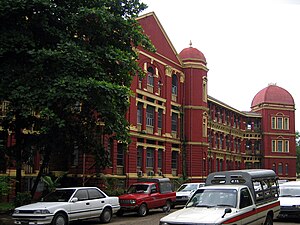 Image via Wikipedia
Image via WikipediaBANGKOK – Thai health officials announced on Saturday the country's first two swine flu-related deaths, while Australia reported its fifth. All three patients also had other health problems.
A 40-year-old Thai woman died June 20 at a Bangkok hospital, while a 42-year-old Thai man died Saturday at a hospital in southern Chonburi province, Public Health Ministry Deputy Permanent Secretary Dr. Paichai Warachit said.
Paichai said her office was only told late Friday about the woman's death. It was unclear where the two contracted the virus, and the ministry refused to identify them.
"It is confirmed that the two patients died because of the H1N1 virus and also because they had pneumonia," Paichai said.
The Public Health Ministry said more than 1,200 people have contracted swine flu as of Saturday, including seven Navy cadets. Most have recovered, though 16 remain in the hospital. None was in critical condition.
In Australia, a 26-year-old woman who also had a serious pre-existing medical condition died late Friday after spending several days in Royal Perth Hospital's intensive care unit, Western Australia chief health officer Tarun Weeramanthri said. Her identity and details of her medical condition were not released.
As of Friday, 3,519 people in Australia had been diagnosed with the virus.
Myanmar reported its first case of the disease on Saturday in a 13-year-old girl who recently returned from Singapore. State television said the girl was taken to Yangon General Hospital on Friday and is being held in isolation.
The report did not provide details about her condition. The other 91 passengers who arrived on her flight are being monitored by the Health Ministry.
New Zealand, meanwhile, raised its tally of confirmed swine flu cases to 507.
Deputy Director of Public Health Darren Hunt said Saturday the country's toll was probably higher since officials are no longer conducting lab tests on all suspected cases, and most people recover from the predominantly mild flu before seeking medical attention.
In Hong Kong, the government confirmed 33 new cases, taking the city's total to 629. There have been no reports of deaths related to the virus in the territory. – AP
From GMANews.tv; see the source article here.




























